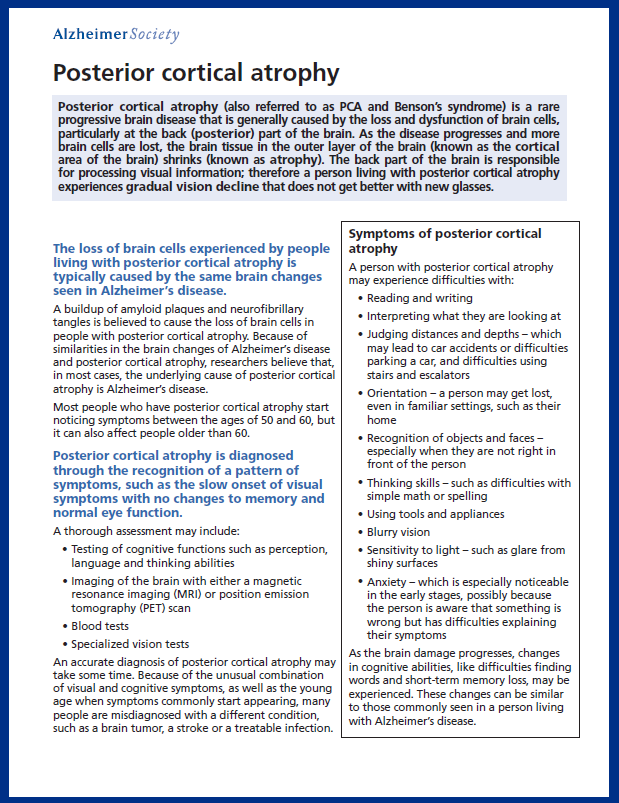Posterior cortical atrophy
Posterior cortical atrophy is a rare progressive neurodegenerative disorder that causes damage and deterioration to the back, or posterior, region of the brain. That area of the brain is responsible for processing what and how we see.

Overview
Posterior cortical atrophy (often shortened to PCA) is a rare progressive neurodegenerative disorder. PCA causes damage and deterioration to the back – or posterior – area of the brain. This area of the brain is responsible for processing what and how we see.
As a result, PCA may affect a person’s vision, their ability to read and write, their ability to navigate, and to reach for objects.
Some scientists think that PCA is caused by the abnormal accumulation of amyloid plaques and neurofibrillary tangles in the brain. Since the presence of plaques and tangles in the brain is also a hallmark feature of Alzheimer’s disease, PCA is often referred to as a variant of Alzheimer’s disease.
Read our print-friendly, downloadable brochure on posterior cortical atrophy in PDF.

Symptoms
Symptoms of PCA are most commonly seen in people in their 50s and 60s, but can affect people until their 80s.
Difficulties with vision
Early symptoms of this disease are often related to difficulties with a person’s ability to process visual information. Some of the common visual processing symptoms of PCA include:
- Blurred vision,
- Challenges with reading and writing,
- Difficulty filling out forms,
- Difficulty seeing objects in the person’s path, and
- Problems with depth perception.
Changes in cognitive abilities
Changes in cognitive abilities may be experienced as PCA progresses and causes more damage throughout the brain. This progression will often result in the onset of symptoms that are typical of Alzheimer’s disease, like challenges with word finding and short-term memory loss.
Anxiety
People in the early stages may experience increased anxiety, possibly because they are aware that something is wrong but have difficulty explaining their symptoms.
Other symptoms
Other symptoms such as difficulties with simple math, knowing how to use tools and appliances, and knowing geographic directions may occur early in the disorder. However, unlike Alzheimer’s disease, short-term memory loss is not a common symptom in the early stages of PCA.
Diagnosis
It can be challenging to diagnose PCA early in the progression of the disease. Adding to the challenges, a diagnosis may take some time as people will often consult an eye doctor first because the symptoms they experience are associated with their vision.
Many people are misdiagnosed because of their young age of onset and the unusual symptoms.
There is no single test to diagnose PCA. Rather, it is typically diagnosed through the recognition of the pattern of symptoms. Physicians assess the patterns and types of symptoms to help rule out other conditions that could be causing the symptoms, such as a brain tumour, a stroke or a treatable infection.
A thorough assessment may also include testing of someone’s thinking abilities, imaging of the brain with either a magnetic resonance imaging (MRI) or computerized tomography (CT), blood tests and specialized vision tests.
Risk factors
Since the presence of plaques and tangles in the brain is characteristic of both Alzheimer’s disease and PCA, research has found that in most cases of PCA, the underlying cause of the disease is Alzheimer’s disease or another dementia.
Other neurodegenerative diseases have also been shown to cause PCA, though this is very rare. These diseases include:
Treatment
Currently, there is no known cure for PCA. However, some medications have been found to be effective in treating its symptoms.
Cholinesterase inhibitors that are used to improve alertness and cognition in people with Alzheimer’s disease can be used in persons with PCA.
Therapeutic approaches
Non-medication therapies can also be helpful, including mental and physical exercises.
Additional therapeutic approaches support people living with PCA to manage symptoms of their disease:
- Occupational and physical therapies can help to improve daily functioning. For example, an occupational therapist may support people with PCA to manage their low vision and move safely around their home.
- Practical visual aids, such as a talking clock, can help to support the continued independence of people with PCA.
More information and resources
Rare Dementia Support Canada. Provides a free specialist information and support service for people living with, or affected by, a diagnosis of rare or young onset dementia.
